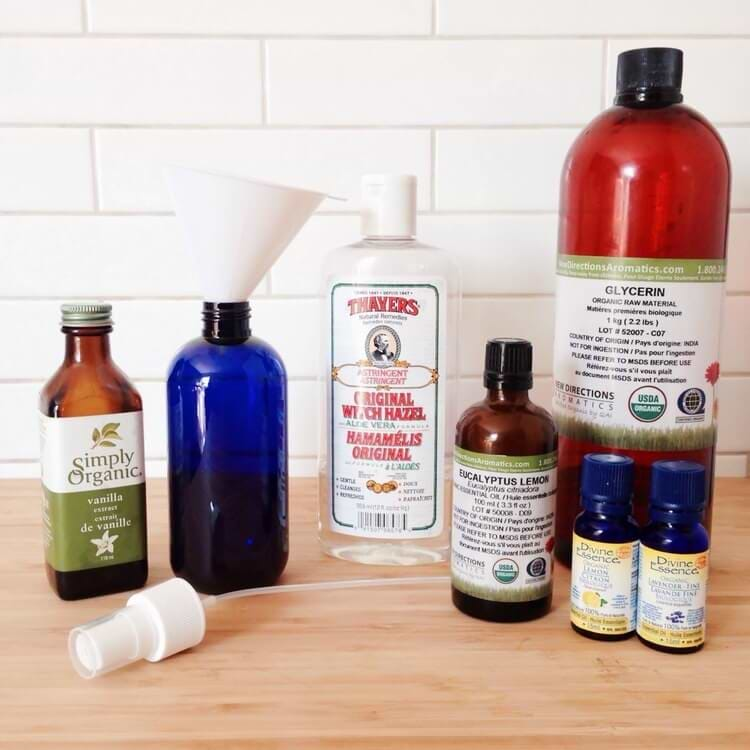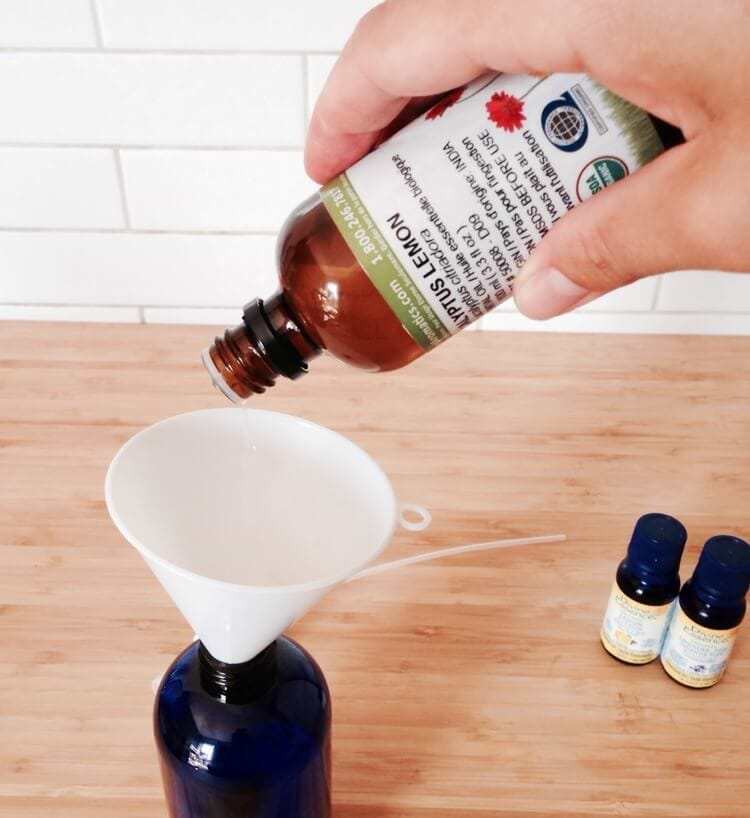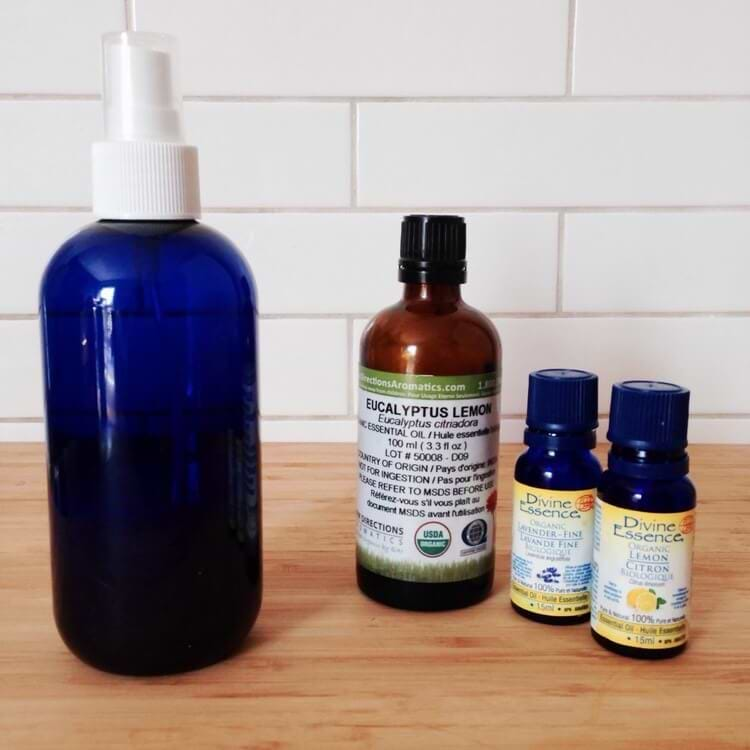Welcome to thoughtful, organic beauty
Hello Joyous is an organic, plant-based, sustainable beauty brand here to bring more joy to your day.
Is it finally summer?! For those of you who haven't had a taste of our Canadian summer this year, it's been a little wonky, to the point where it hasn't really felt like summer up until now. I've actually been holding onto this gem of a DIY Natural Bug Spray recipe from my DIY goddess, Kathrin Brunner of For The Love Of Body, since the beginning of summer but it hasn't felt like a suitable time to share it with you until now!
Since we have another long weekend quickly approaching us and many people will be heading to the cottage or cabin, camping or spending time outdoors, I thought this would be the perfect time to share this recipe for DIY Natural Bug Spray!

I love spending time outside, but pesky mosquitos are a real buzz kill. I use to douse myself in conventional bug spray to prevent getting eaten alive until I finally took a look at what's hiding in that stuff that supposedly "protects us". After reading this, you might actually prefer scratching those bug bites for days on end than to face the consequences of conventional bug spray – just maybe!
The Problem With Conventional Bug Spray
There are a few things in conventional bug spray that are worrisome – Picaridin, IR3535 and the most well known active ingredient, DEET (Diethyl-meta-toluamide). DEET was initially developed for the military in 1946 and was later released for public use in 1955. I think it's fair to say that bodily toxicity was less of a priority than avoiding being eaten alive by these buggers. DEET doesn't necessarily kill mosquitos, but it will deter and repel them by interfering with the neurons and receptors on the mosquito's antennae that detect the chemicals.
If you bought my Eczema Healing Guide or have read my posts about natural skin care, you've probably heard me say that what goes on you, goes in you and the majority of what you put on your skin is absorbed into your bloodstream. The same goes for DEET.
The majority of what you put on your skin is absorbed into your bloodstream.
DEET has been linked to skin irritation, neurotoxicity, dizziness, insomnia, seizures, and disorientation. Even more worrisome, is that many people are applying DEET-containing bug sprays with sunscreen containing oxybenzone. This causes it to be absorbed into our bloodstream even faster, which risks damage to the brain and other organs even more.
I have never put DEET-based bug spray on my daughter Vienna and I never will. If you have children, steer clear of this chemical.
If that's not enough to steer you away, DEET is also an effective solvent, meaning it can dissolve plastic, rayon, spandex and even strip varnish from wood. If DEET can have such a strong effect on synthetic materials, imagine what it can do to our living cells and skin!
There are definitely other alternatives like Picaridin that don't contain the same neurotoxicity concerns as DEET, but with that, you'll usually find fragrance (here are my thoughts on that), phthalates and other synthetic ingredients to make you smell bug-spray-y "fresh" and to prolong the shelf life. All of these ingredients together are a cocktail for a hormonal disrupting disaster!
With all of that said, sometimes it does come down to weighing our pros and cons and choosing the lesser evil – sometimes that's conventional bug spray.
What I mean by this is that it's not only the severe itching that comes with mosquito bites that we want to steer clear of but it's the disease-carrying mosquitos too. Depending on where you live in the world or where you are traveling to, malaria, West Nile, yellow fever, dengue fever and Zika are the mosquito-borne disease we need to think about.
But before you do that, take a little gander at some of the suggestions I've included below on what you can do instead of using conventional bug spray, or if you do use it, how you can go about it safely.
What You Can Do Instead
Don't be so quick to reach for the bottle of conventional bug spray! If you can (and if it safe for you to do so), strive for this to be your last resort and explore the other options below first.
Cover Up
One simple practice you can start with is giving mosquitos a smaller target to nibble away at you! That means covering up your skin as much as possible with long, loosely layered light clothing since mosquitos are attracted to dark clothing. Don't be shy to throw a bug net on! I know they may not be the most fashionable but you'll be glad you did!
Avoid Mosquito Breeding Grounds
Everyone has heard someone say something along the lines of "mosquitos love my blood" before – and if you're wondering if this is true or not, it is (watch out Type O Blood friends -- which includes me).
And while we can't change our blood type, we CAN change the environment we're in which will dictate whether or not mosquitos might be present. Mosquitos are drawn to certain environments more than others. It's no wonder it's almost inevitable that we get eaten alive when we're by the water and surrounded by trees on a warm night. Some other things you can do to encourage mosquitos to "buzz off" are:
Make Your Own Natural DIY Bug Spray
Never underestimate the power of essential oils,which is essentially (no pun intended) what this natural bug spray is made up of! The key player in this recipe is the lemon eucalyptus essential oil. This is because it's high in a compound called citronella which many know of because of citronella candles that use citronella essential oil. Funny enough though, lemon eucalyptus essential oil contains up to 75% of the compound citronella while citronella essential oil only contains 8%!

Where natural bug spray has been known to fall short is its lasting effect since essential oils are volatile and don't stay on the skin for very long (which ultimately, is a very good thing!). However, you'll notice there's a little splash of vanilla in this recipe (and it's not just for its delicious natural scent!). Through Kathrin's research, she discovered that there's a compound in vanillin that slows down the volatility which extends the effectiveness of the essential oils. What a smarty pants, eh?!
I trust this Natural DIY Bug Spray from Kathrin because it is tried and true! She went through quite the process of creating a durable natural bug spray and facing the consequences of some not-so-successful attempts that involved getting eaten alive (I'm sorry Kathrin!!) All of her research and trial & error led her to this super clean, non-toxic bug spray that actually works and I'm excited to share it with you!

Note: Essential oils are strong. Do not use on children under 5. Test patch a small area of skin on your arm and don't use if there's a reaction. Thank you to For the Love Of Body for providing this recipe!
I do just want to squeeze in one last small and gentle reminder that if you are traveling to a tropical location where mosquito-borne diseases may be active or prevalent, please do your research beforehand to ensure you have taken all of the necessary precautions in protecting yourself!
Have a happy bug-free Summer!
Thank you to Kathrin Brunner of For The Love of Body for sharing this amazing DIY Bug Spray recipe and for providing these images!
I use a recipe similar to this and I love it! Smells and works FAR better than the DEET or other common bug sprays you can buy from the store. Plus you're not putting cancer-causing chemicals on your skin...allowing them to soak in to your body. Bonus! I discovered that by using Young Living's essential oils, I was able to cut the number of drops of essential oils I was using in half! Because of the difference in quality and purity of their oils. They have a blend called Purification that has Citronella, Rosemary, Lemongrass, Tea Tree, Lavandin and Myrtle essential oils all in it - all are awesome in keeping away the mosquito's...so combine them together and it's a powerhouse blend of oils as a bug spray! Love when it's simple like that - and actually GOOD for our bodies! Thanks for sharing your post!
ReplyHey Ashley! That's awesome! So happy to hear you've had so much success with it already :) Essentials oils are pretty mighty at keeping those skitters away! Rachel - Joyous Health Team
Do you have a recipe like this for a diy citronella candle instead? If I can't put essential oils OR deet bug spray on my 8 month old baby, a candle would be the next best thing, no?
ReplyHey Jackie, We don't have a citronella candle unfortunately. That would definitely be the lesser evil to keep the mosquitos away and avoid direct skin contact at the same time. You can also cover up your baby with clothing to ensure no skin is exposed. That's what Joy has done so far and it has worked out great :) Rachel - Joyous Health Team
This is a great article, thank you. Do you have any recommendations of bug repellants for babies and toddlers?
ReplyHey Melanie, Joy hasn't used any bug spray on Vienna yet and has opted for the "cover up" method by covering all of her exposed skin with clothing. That would be a great place to start, as well to avoid exposure to mosquitos as much as possible. Rachel - Joyous Health Team
Hi there, This sounds like a much better alternative to the toxic chemicals in most bug sprays! I hate to sound like a party-pooper, but I would feel irresponsible if I didn't mention that most essential oils, with the exception of vanilla, have a scientifically proven sensitizing effect on the skin, especially when exposed to sunlight. This means the skin is becoming damaged while in contact with the essential oils, even if it isn't immediately apparent. For the sake of your skin, it would be best to apply this to clothing only...and if it absolutely must be applied to the skin, only after the sun has gone down.
ReplyHey Samantha! That's a great point - thanks so much for sharing! Rachel - Joyous Health Team
In the photo a bottle of lavender essential oil is shown but it is not included in recipe. Can you clarify if this is part of the recipe?
ReplyOops! Good eye Shirley! Yes, you can add 10 drops of lavender essential oil or any essential oil of your choice :) Rachel - Joyous Health Team
Thankyou I always know to look to you for the answers.
ReplyHappy to hear this was helpful for you Heather :) Rachel - Joyous Health Team
Hi Joy thanks for this recipe. Can I use dr bronner's liquid soap instead of glycerine which I don't have at hand?
ReplyHmmm, I'm not sure that would be a good substitution. Glycerine is a humectant so it attracts moisture and soothes skin. If Dr. Bronner's does the exact same thing as glycerine then it would be fine but I'm really not sure.